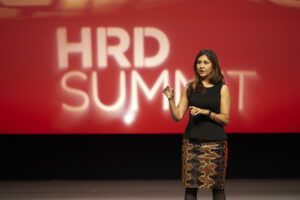Why entrepreneurial employees need to be challenged
- 5 Min Read
Many people most readily associate the word “entrepreneur” with individuals. Initial thoughts tend to turn towards the likes of Steve Jobs, Bill Gates or even – at least until recently – Donald Trump. The word “innovator” provokes much the same knee-jerk response.
- Author: Professor Simon Mosey
- Date published: Feb 23, 2018
- Categories

It’s this kind of thinking that perpetuates a longstanding and damaging myth – the misguided notion that entrepreneurship and innovation are the exclusive preserves of a chosen few. We’re immediately in the realms of super-dynamic business founders, charismatic leaders, research & development (R&D) wizards, “them”.
This, quite frankly, is nonsense.
 The truth may seem less glamorous, but it’s actually just as exciting and maybe even more so. Real and lasting competitive success is driven not by rock-star CEOs or “geniuses” but by entrepreneurship and innovation as organisational constructs – and that means everyone should be involved.
The truth may seem less glamorous, but it’s actually just as exciting and maybe even more so. Real and lasting competitive success is driven not by rock-star CEOs or “geniuses” but by entrepreneurship and innovation as organisational constructs – and that means everyone should be involved.
It also means attracting the right people in the first place and ensuring they encounter a culture that encourages them to stick around. Although it’s tempting to think a sizeable wage goes a long way towards ticking this box, there’s plenty of evidence to suggest generous remuneration plays only a small part in the retention of entrepreneurial, innovative employees.
The Unilever Professor
One person especially well placed to comment on this issue is Unilever’s Jim Crilly, who has held 16 different positions across the whole R&D spectrum during his 30 years’ service with the company. Unilever is a classic example of an entrepreneurial and innovative company whose culture and vision have carried on for decades, and Crilly has pioneered several major projects during his time there.
In Crilly’s vast experience – which he was gracious enough to reflect on as part of our latest research – entrepreneurs and innovators may well expect fair reward for their efforts but seldom see pay alone as a deal-breaker. Instead they’re mostly motivated by factors such as the freedom to work on interesting and purposeful initiatives, the pleasure of peer recognition and the intellectual stimulation that comes from a cross-disciplinary philosophy.
In other words, the sort of people who preserve an organisation’s entrepreneurial and innovative outlook enjoy exercising their minds. As Unilever and less long-established giants such as Apple and Google have shown, one way to ensure they have ample opportunity to do so is to instigate “innovation challenges”.
Crilly highlights the importance of direction and focus in maximising the effectiveness of such initiatives. It’s not enough, he says, merely to ask for ideas, as many of them may well turn out to be comparatively aimless. As Unilever realised some time ago, it’s best to provide a degree of framing – say, the general area on which to concentrate, the consumer needs that ought to be met or the types of technologies that might be exploited.
Jobs did precisely this when he invited Apple’s employees to work around the notion of “a thousand songs in your pocket”. The result was the iPod. There’s nothing wrong with purely spontaneous innovation – after all, the search for a truly brilliant idea is sometimes greatly assisted and informed by a trawl through lots of bad ones – but a trade-off between quantity and quality is obviously desirable in the long run.
It’s by challenging employees that organisations maintain energy and inspiration. The alternative is to slip into a rut of ingrained thinking, with deep-rooted behaviours and routines increasingly defining “the way things are done around here”. Some of the biggest and most successful companies have fallen victim to the curse of inertia, the comfort of complacency and the cosy appeal of stability.
Embracing the radical
Consider, for instance, Hoover, whose managers famously rejected James Dyson’s concept of a cyclone vacuum cleaner. While Dyson saw how the functionality of his invention would benefit consumers, Hoover’s decision-makers couldn’t envisage a world without dust-collecting bags – a key revenue stream in their longstanding business model. This is what can happen when an organisation becomes so mired in the incremental that it fears embracing the radical.
And this brings us to another crucial point: it’s vital to recognise that entrepreneurs and innovators are willing to take risks and that risks can occasionally end in mistakes. Tolerance of failure is therefore imperative because failure is a necessary element of learning. As Crilly stresses in defending the cause of “scientific dabbling”, innovation isn’t a defined science: you have to try things and see what happens.
The bottom line is that even a company set up by an entrepreneur or an innovator is by no means guaranteed to mirror its founder’s qualities forever. After all, Henry Ford gave the world an entirely new way of doing business, but the Ford Motor Company of today bears few of the distinctive hallmarks of his dynamism and inventiveness. Ultimately, it’s an enterprise’s ongoing behaviour that counts – and that’s why it’s so important both to find and to challenge employees who have the necessary mindset.
Simon Mosey is a Professor of Entrepreneurship and Innovation at Nottingham University Business School, Director of its Haydn Green Institute for Innovation and Entrepreneurship (HGIIE) and co-author of ‘Building an Entrepreneurial Organisation’. [email protected]



